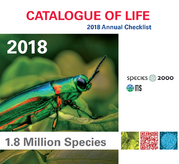Biology:Catalogue of Life
 Cover of DVD version of database | |
Type of site | Taxonomic catalogue |
|---|---|
| Available in | English |
| Website | catalogueoflife.org |
| Alexa rank | |
| Commercial | no |
| Registration | not required |
| Launched | June 2001 |
| Current status | active |
The Catalogue of Life is an online database that provides the world’s most comprehensive and authoritative index of known species of animals, plants, fungi and micro-organisms. It was created in 2001 as a partnership between the global Species 2000 and the American Integrated Taxonomic Information System. The catalogue is available in twelve languages and is used by research scientists, citizen scientists, educators, and policy makers.[2] The catalogue is used by the Biodiversity Heritage Library, the Barcode of Life Data System, Encyclopedia of Life, and the Global Biodiversity Information Facility.[3] The catalogue currently compiles data from 168 peer-reviewed taxonomic databases, that are maintained by specialist institutions around the world. As of 2018, the catalogue lists 1.8m of the world's 1.9m named species.[4]
Structure
The Catalogue of Life employs a simple data structure to provide information on synonymy, grouping within a taxonomic hierarchy, common names, distribution and ecological environment.[4]
The Catalogue provides a dynamic edition,[5] which is updated monthly (and in which data can change without tracking of those changes) and an Annual Checklist,[6] which provides a dated, verifiable reference for the usage of names and associated data. Development of the Catalogue of Life was funded through the Species 2000 europa (EuroCat),[7] 4d4Life,[8] i4Life[9] projects in 2003-2013, and currently by the Naturalis Biodiversity Center, Leiden, the Netherlands and Species Files group at Illinois Natural History Survey, Champaign-Urbana IL, USA.
Usage
Much of the use of the Catalogue is to provide a backbone taxonomy for other global data portals and biological collections. Through the i4Life project it has formal partnerships with Global Biodiversity Information Facility, European Nucleotide Archive, Encyclopedia of Life, European Consortium for the Barcode of Life, IUCN Red List, and Life Watch. The public interface includes both search and browse functions as well as offering multi lingual services.[3]
The catalogue listed 300,000 species by 2003, 500,000 species by 2005, and over 800,000 species by 2006.[10] As of 2018, the catalogue lists 1.8m of the world's 1.9m named species.[4] There are an estimated 14m species, however this number is not certain as there is a lack of data on the possible number of insect, nematode, bacteria and fungus species.[11]
Catalogue of Life Plus
In 2015, an expert panel presented a consensus hierarchical classification of life. The classification embraces 1.6 million species provided by more than 3,000 taxonomists. The unified, coherent, hierarchically-ranked system is known as the Catalogue of Life.[12]
In the same year, the Catalogue of Life, Barcode of Life Data System, Biodiversity Heritage Library, Encyclopedia of Life, and the Global Biodiversity Information Facility commenced building a single shared authoritative nomenclature and taxonomic foundation that could be used to order and connect biodiversity data. COL+ will develop a clearinghouse covering scientific names across all life, provide a single taxonomic view, and provide an avenue for feedback from content authorities.[3]
See also
- ARKive
- Encyclopedia of Life
- GBIF Global Biodiversity Information Facility
- Global biodiversity
- Integrated Taxonomic Information System ITIS
- Wikispecies
- World Register of Marine Species
References
- ↑ "Catalogueoflife.org Site Info". Alexa Internet. http://www.alexa.com/siteinfo/catalogueoflife.org. Retrieved 2018-06-24.
- ↑ Harmon, Joanie (2 December 2016). "Animal, vegetable, data: Exploring the online 'Catalogue of Life'". UCLA News Room. http://newsroom.ucla.edu/stories/robert-montoya-catalogue-of-life. Retrieved 23 June 2018.
- ↑ 3.0 3.1 3.2 Bánki, Olaf; Döring, Markus; Holleman, Ayco; Addink, Wouter (2018). "Catalogue of Life Plus: Innovating the CoL systems as a foundation for a clearinghouse for names and taxonomy". Biodiversity Information Science and Standards 2: e26922. doi:10.3897/biss.2.26922.
- ↑ 4.0 4.1 4.2 "About the Catalogue of Life: 2018 Annual Checklist". Catalogue of Life. Integrated Taxonomic Information System (ITIS). http://www.catalogueoflife.org/annual-checklist/2018/info/about. Retrieved 22 May 2012.
- ↑ "Catalogue of Life - 30th October 2017 : Search all names". http://www.catalogueoflife.org/col/.
- ↑ "Catalogue of Life - 2017 Annual Checklist : Search all names". http://www.catalogueoflife.org/annual-checklist/.
- ↑ "Species 2000 europa - Welcome to Species 2000 europa". 3 February 2008. Archived from the original on 3 February 2008. https://web.archive.org/web/20080203100153/http://sp2000europa.org/.
- ↑ Admin. "Home - 4D4Life". http://www.4d4life.eu/.[yes|permanent dead link|dead link}}]
- ↑ "i4life: Indexing For Life". http://www.i4life.eu/.
- ↑ Cachuela-Palacio, Monalisa (2006). "Towards an index of all known species: The Catalogue of Life, its rationale, design and use". Integrative Zoology 1 (1): 18–21. doi:10.1111/j.1749-4877.2006.00007.x. PMID 21395986.
- ↑ United Nations Environment Programme (2002). Global Environment Outlook 3: Past, Present and Future Perspectives. EarthScan Publications, London. p 120
- ↑ Ruggiero, Michael A; Gordon, Dennis P; Orrell, Thomas M; Bailly, Nicolas; Bourgoin, Thierry; Brusca, Richard C; Cavalier-Smith, Thomas; Guiry, Michael D et al. (2015). "A Higher Level Classification of All Living Organisms". PLOS One 10 (4): e0119248. doi:10.1371/journal.pone.0119248. PMID 25923521.
Further reading
- Blundell N (2005). There's more to life on Earth. Telegraph Online, 8 Dec 2005 (retrieved 2012-05-03).
External links
- Catalogue of Life: monthly updated editions
- 2018 Annual Checklist, 1,803,488 species (incl. extinct)
- 2017 Annual Checklist, 1,713,852 species (incl. extinct)
- 2016 Annual Checklist, 1,640,969 species
- 2015 Annual Checklist, 1,606,554 species
- 2014 Annual Checklist, 1,578,063 species
- 2013 Annual Checklist, 1,352,112 species
- 2012 Annual Checklist, 1,404,038 species
- 2011 Annual Checklist, 1,347,224 species
- 2010 Annual Checklist, 1,257,735 species
- 2009 Annual Checklist, 1,160,711 species
- 2008 Annual Checklist, 1,105,589 species
- 2007 Annual Checklist, 1,008,965 species
- 2006 Annual Checklist, 884,552 species
- 2005 Annual Checklist, 526,323 species
- A list of contributing databases
- Catalogue of Life Twitter
 |

